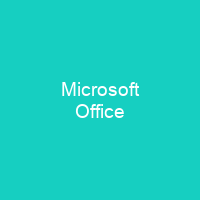Microsoft Office: A Journey Through Time
Imagine stepping into a time machine that transports you back to 1988. That’s when Microsoft first announced its office suite, which has since grown and evolved into the powerhouse we know today. How did this humble beginning transform into such an integral part of our daily lives?
The Core Components
At its core, Microsoft Office consists of applications like Word, Excel, and PowerPoint. These tools have been the backbone of productivity for decades, helping businesses and individuals alike to create documents, manage finances, and present ideas with flair. Can you imagine a world without these essential tools?
The Suite Expands
Over time, Microsoft Office has expanded its offerings significantly. OneNote, Outlook, and OneDrive have joined the original trio to form a comprehensive suite that caters to various needs. How do these additions enhance your productivity?
The Shift to Cloud
In 2013, Microsoft introduced Office 365 as the primary means of obtaining the software. This shift towards a subscription-based model with feature updates and cloud integration marked a significant change in how we use office applications. Does this transition make your work more flexible?
The Web Apps
Office on the web, including Word, Excel, and PowerPoint, offers a lightweight version of these tools accessible through any browser. This means you can create documents anywhere, anytime—perfect for those who are always on the go. How does this feature impact your workflow?
The Mobile Revolution
With the rise of smartphones and tablets, Microsoft introduced Office Mobile for iPhone and Android in 2013. This allowed users to access their documents from anywhere, making it easier than ever to stay productive on the go. How has this changed your mobile work habits?
The Future
Office continues to evolve with new features and updates. From real-time co-authoring in Office Online to the introduction of Microsoft Teams, each update brings us closer to a seamless, integrated workspace. What excites you most about future developments?
The Security Features
Security is paramount in today’s digital age. Office offers robust encryption features and metadata removal tools to protect sensitive information. These features ensure that your documents remain secure, no matter where they are stored or shared. How do these security measures make you feel more confident?
The Discontinued Applications
While many applications have been added over the years, some have also been discontinued. From FrontPage to Office Accounting, each change reflects Microsoft’s commitment to staying relevant and meeting user needs. Which of these changes do you find most interesting?
The Privacy Concerns
Privacy has become a significant concern in recent years. The Netherlands’ investigation into Office 2016 and Office 365 highlighted issues with data collection and transparency. Microsoft has since taken steps to address these concerns, but the debate continues. How do you feel about this?
The Future of Office
As we look ahead, Office is poised to continue its evolution. With ongoing improvements in cloud integration and mobile support, it’s clear that Microsoft remains committed to providing the best tools for productivity. What do you think the future holds for Microsoft Office?

Microsoft Office has come a long way since its inception. From the early days of Word, Excel, and PowerPoint to the current suite that includes cloud integration, mobile support, and advanced security features, it’s clear that this software has become an indispensable tool for professionals worldwide. As technology continues to advance, Microsoft Office will undoubtedly continue to adapt and evolve, ensuring it remains a leader in productivity solutions.
You want to know more about Microsoft Office?
This page is based on the article Microsoft Office published in Wikipedia (retrieved on November 29, 2024) and was automatically summarized using artificial intelligence.






